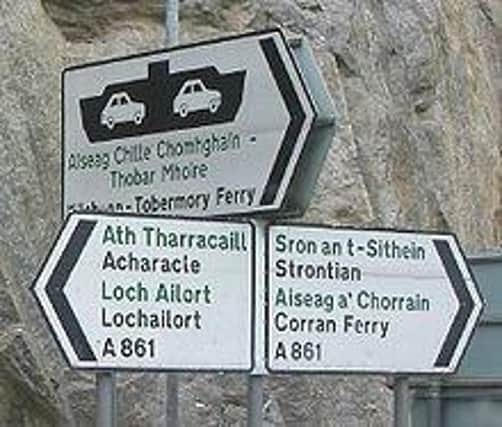Chaidh luchd na Gàidhlig an leigeil sìos gu mòr le co-dhùnadh an Riaghaltais


[English-language version below]
Ann an suidheachadh dhen t-seòrsa sin, cha bhi farmad aig mòran dhan luchd-phoileataigs, gu h-àraid dhaibh-san air a bheil an t-uallach na co-dhùnaidhean cruaidh is duilich sin a dhèanamh.
Ach bhiodh e na chuideachadh nach beag – dha-rìribh ciallach – ma tha an làmh cheart is an làimh chlì ag obair còmhla; mura h-e teachdaireachd chaochlaideach a tha iad a’ toirt seachad dhan t-sluagh.
Advertisement
Hide AdAdvertisement
Hide AdBhon taobh a-muigh agus dha cuid, ‘s dòcha gu bheil mì-thoileachas na coimhearsnachd Gàidhlig ri gearraidhean an Riaghaltais beagan neo-chothromach. Nach bu chòir dhaibh, mar a h-uile roinn eile, an cuibhrean fhèin dhen dhuilgheadas a ghiùlan?
Tha bunait mhoralta air a sin. Ach, ‘s e an duilgheadas gur e dealbh gu math diofraichte a bha an Riaghaltas fhèin a’ toirt seachad.
Bha a h-uile coltas gun robh iad air gabhail ris, mu dheireadh thall, gum feum mòran a bharrachd a dhèanamh airson an cànan a shàbhaladh mar chànan coimhearsnachd anns na sgìrean traidiseanta.
Dha-rìribh, bha Bile nan Cànanan Albannach, a thàinig a-mach aig deireadh 2023, a’ cur prìomhachas air “sgìrean cànain brìghmhor” far an robh a’ Ghàidhlig bitheanta gu bho chionn ghoirid. Chan eil agus cha robh e builleach soilleir dè dha-rìribh a bha seo a’ ciallachadh. Ach, gu cinnteach; cha robh dùil aig duine gum biodh e a’ ciallachadh gum feumadh roinnean eile dhen Ghàidhlig fulang ri linn.
Ann an 2021/2022, thug Riaghaltas na h-Alba àrdachadh de £400,000 sa bhliadhna dha Bòrd na Gàidhlig; a' bhliadhna às dèidh sin £500,000 agus ann an 2023/2024 £354,000.
Cha b’ e fialaidh mhòr sam bith a bh’ air a chùlaibh ach tuigse gum feumadh Bòrd na Gàidhlig tòrr a bharrachd taice airson nan dleasdanasan aca a choileanadh agus a’ Ghàidhlig a dhìon mar rud prìseil do chultar na h-Alba. Ach, bha a h-uile coltas gun robh àrainneachd thaiceil ga cruthachadh.
Agus an t-seachdain-sa, thàinig am buille chruaidh, a-mach às an adhar cha mhòr, gun tig £354,000 a thoirt bho Bhòrd na Gàidhlig sa bhliadhna a tha romhainn.
An coimeas ri buidseat farsaing Riaghaltas na h-Alba ‘s mòr as fhiach e. Cha phàigheadh e fiu ‘s airson còta-peant air an Glen Sannox.
Advertisement
Hide AdAdvertisement
Hide AdAch dhan Ghàidhlig, bheir e buaidh mhòr. Thuirt Bòrd na Gàidhlig gum feumadh iad cur às do dhithis oifigearan planaidh-cànain agus oifigear foghlaim, a thuilleadh air lìonradh de dh’oifigearan leasachaidh air feadh Alba.
‘S beag an t-iongnadh gu bheil luchd na Gàidhlig air an tàmailteachadh agus feargach.
Tha Riaghaltas na h-Alba ag ràdh gu bheil iad fhathast taiceil dhan chànan. ‘S dòcha gur e sin a tha aon làmh ag ràdh. ‘S e duan gu math eadar-dhealaichte a th’ aig an làimh eile.
English-language version:
Politics, as the famous saying goes, is all about choices. Or to paraphrase for times of economic crisis when the public purse is running dry: it’s about who you are going to disappoint the most. In such circumstances, the lot of a politician – in particular a government minister – can seem rather unenviable.
However it helps, and would certainly seem eminently sensible, if your right hand is in tune with the left; if conflicting messages are not your stock in trade. From the outside, the outraged reaction of the Gaelic community when it emerged that they will be among the sectors to suffer from government cutbacks might seem a bit out of proportion. We are talking about £345,000, after all, and shouldn't they take their fair share of medicine like everyone else?
That, of course, carries a certain moral rationale. The problem here is that the mood music that was being played by government ministers towards the language has been the very opposite, and right up until this week. It appeared that, finally, they had listened to the need for meaningful intervention and recognised time was running out to save it as a community language in its traditional heartlands.
The Scottish Languages Bill, published at the end of 2023, set out a new focus on “areas of linguistic significance” where the language was once commonplace, a welcome if vague commitment. However no one for one minute thought that a new direction in that sense would have to be at the expense of Gaelic developments elsewhere.
Back in 2021/22, the Scottish Government gave the national Gaelic development agency, Bord na Gaidhlig, an additional £400,000. In 2022/2023, £500,000 and in 2023/24, £354,000. That was not to do with any particular largesse, but a recognition of the challenges faced by the main organisation responsible for Gaelic’s place in Scotland’s cultural landscape. So a supportive environment seemed to have been fostered.
Then came this week’s blow to the solar plexus of the Gaelic body: £354,000 will be cut from Bord na Gaidhlig for the next financial year. It is worth noting that the sum, in terms of the wider Scottish Government finances, is comparatively inconsequential. It probably wouldn’t even pay for the carpets on the MV Glen Sannox.
But, for Gaelic, the effect is going to be deep and lasting. Bord na Gaidhlig said that it would mean the loss of two language planning officers and an education manager as well as the organisation’s scheme that places a network of Gaelic development officers throughout Scotland, including in “areas of linguistic significance”.
It is little wonder that Gaelic campaigners feel disappointed and betrayed. The Scottish Government insist they remain committed to Gaelic. That may be their right hand speaking. The left is talking in a completely different language.
Comments
Want to join the conversation? Please or to comment on this article.